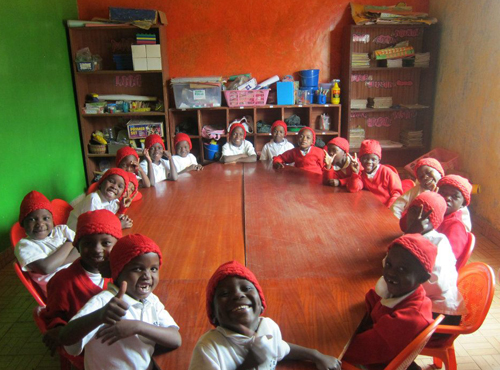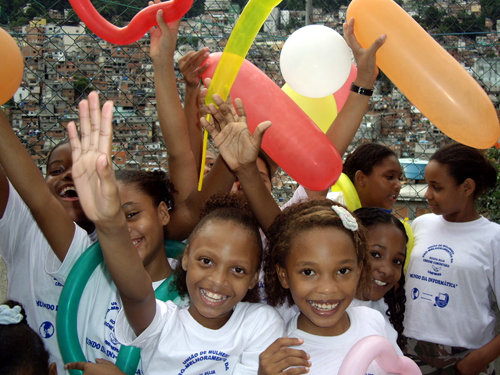Children living in informal settlements must grow up fast: they are often the informal solution for their families struggling to deal with daily problems involving infrastructure access and livelihoods. Children too often fetch water, watch over younger siblings and sick household members, and step into the role of productive contributors to help the household make ends meet. Saddled with these responsibilities, they must often limit or forego their schooling, cutting short their future educational potential and the economic and social opportunities, as well as skills, that education affords. This vicious cycle of poverty is one of the biggest issues in development, and necessitates significant creativity to problem solving.
The following initiatives from Lagos, Nairobi, Mumbai, Mexico City, and Rio de Janeiro, deliver impressive results. Read on to learn more, and then join the discussion on URB.im.
In Lagos, Action Health Inc. develops educational solutions that are accessible to out-of-school adolescent girls, including through evening classes and classes coordinated with childcare to enable students to balance their household responsibilities with their education. They have also developed community sports programs to create social spaces where youth can interact in a fun and healthy environment. Action Health Inc. provides easy-to-access business development, entrepreneurship programs, and personal finance education to build girls' economic empowerment, and offers mentorship programs with successful working women in the community.
 The Kibera School for Girls is the Nairobi slums's first free school for girls. It currently serves about 100 students, and provides a superior level of education, two daily meals, uniforms, health care, and school supplies, all free of charge, as well as after-school programs and psychological support to girls who have suffered from various forms of abuse. While the Kenyan curriculum emphasizes memorization and passing exams, the KSG strives to make its curriculum a student-centered experience that fosters creativity and critical thinking skills. By promoting weekly debates and community service projects, the school offers an enabling environment from which students will be able to create their own path out of poverty and become proactive and engaged citizens and leaders who can achieve real change in their society.
The Kibera School for Girls is the Nairobi slums's first free school for girls. It currently serves about 100 students, and provides a superior level of education, two daily meals, uniforms, health care, and school supplies, all free of charge, as well as after-school programs and psychological support to girls who have suffered from various forms of abuse. While the Kenyan curriculum emphasizes memorization and passing exams, the KSG strives to make its curriculum a student-centered experience that fosters creativity and critical thinking skills. By promoting weekly debates and community service projects, the school offers an enabling environment from which students will be able to create their own path out of poverty and become proactive and engaged citizens and leaders who can achieve real change in their society.
In Mumbai, overcrowded classrooms and high rates of teacher absenteeism have led to the flight of most middle class and wealthy families to private schools. However, the national government recently upheld a controversial ruling to make it mandatory for certain public and all private schools to reserve 25 percent of their seats for low-income children. Many are calling the integrated classroom "revolutionary," citing the potential to influence an entirely new direction for the country. Several schools are already devising strategies to avoid the quota, but this law does hold extraordinary potential, despite significant implementation challenges such as the difference in educational levels between low-income and high-income schools.
Mexico City's Adopt-A-School Foundation builds, maintains, and equips schools thanks to in-kind donations. Launched by a group of entrepreneurs worried by the quality of the city's education, the foundation creates a culture of social participation: the organization has a positive impact on the students and also improves relationships with the wider community. The foundation is an important alternative to the state, working to close the educational gap between marginalized and developed areas.
 The Developing Minds Foundation works in Rio de Janeiro's favelas to provide vocational education programs to transform children's lives. The foundation works with local community-based organizations that have extensive knowledge of the neighborhood and its needs. Certain projects teach children computer and video editing skills, while others focus on the promotion of physical education and football training, thereby promoting a healthy lifestyle away from drug abuse and other harmful activities.
The Developing Minds Foundation works in Rio de Janeiro's favelas to provide vocational education programs to transform children's lives. The foundation works with local community-based organizations that have extensive knowledge of the neighborhood and its needs. Certain projects teach children computer and video editing skills, while others focus on the promotion of physical education and football training, thereby promoting a healthy lifestyle away from drug abuse and other harmful activities.
These five initiatives are important steps in providing education to children living in slums across the Global South. Visit URB.im to read more about these innovative approaches and to discuss other projects you know of.